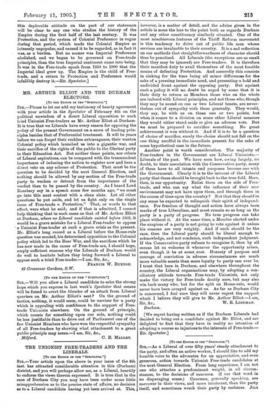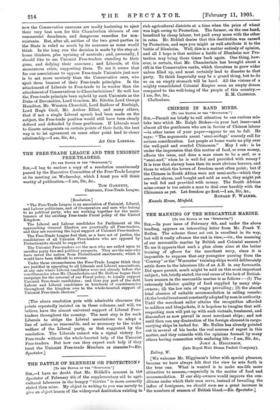SIR,—As a Liberal of over fifty years' steady attachment to
the party, and often an active worker, I should like to add my humble voice to the advocates for an appreciative, and even generous, action towards Unionist Free-trade candidates at the next General Election. From long experience, I am not one who attaches a predominant weight, in all circum- stances, to the decisions of caucuses. (I use that word in no disparaging sense.) Caucuses, generally speaking, are narrower in their views, and more intolerant, than the party itself, and sometimes wreck their party by rashness. Just
now the Conservative caucuses are madly hastening to eject their very best men for this Chamberlain chimera of our commercial decadence, and dangerous remedies for non- existent& But, after all, neither of the two great parties in the State is ruled so much by its caucuses as some would think. In the long run the decision is made by the stay-at- home thinkers, plus uprising of neutrals ; and, personally, I should like to see Unionist Free-traders standing to their guns, and defying their caucuses ; and Liberals, at this momentous crisis, supporting them. To me it seems that for our associations to oppose Free-trade Unionists just now is to act more unwisely than the Conservative ones, who eject them because of their Free-trade principles. Is the attachment of Liberals to Free-trade to be weaker than the attachment of Conservatives to Chamberlainism P So well has the Free-trade principle been upheld by such Unionists as the Duke of Devonshire, Lord Goschen, Mr. Ritchie, Lord George Hamilton, Mr. Winston Churchill, Lord Balfour of Burleigh, Lord Hugh Cecil, Mr. Arthur Elliot, and many others, that if not a single Liberal speech had been made on the subject, the Free-trade position would still have been clearly defined and defended by these gentlemen. If Liberals want to disarm antagonists on certain points of their faith, the best way is to let agreement on some other point lead to closer







































 Previous page
Previous page